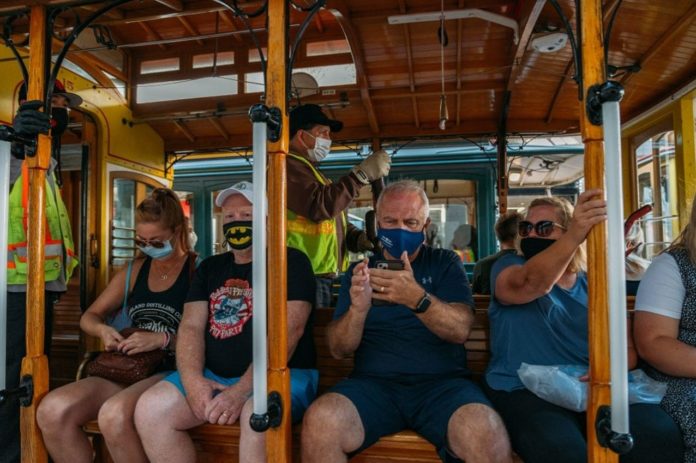Israel, one of the first countries to begin COVID-19 vaccinations and the first to implement a large-scale booster shot programme, is providing a chilling glimpse of what other wealthy nations may face if they begin boosters this fall.
Israel launched its pioneering booster campaign in late July, prompted by an increase in cases due to the Delta variant’s extreme contagiousness, the relaxation of restrictions, and an apparent decline in protection from early winter vaccines.
However, cases have increased even further since then, indicating that boosters are not a panacea for children and others who remain unvaccinated.
Since 30 July, Israel has administered a third dose of messenger RNA vaccine to over 3 million people, the majority of whom are aged 40 or older. Israel, on the other hand, is “stuck in a status quo of 1000 or 900 new cases per million per day,” according to Ran Balicer, chief innovation officer at Clalit Health Services, Israel’s largest health maintenance organization, “which is a very bad status quo to be stuck at”.
Public health officials disagree on why a country with a population of 9.3 million that is so aggressively vaccinating still has one of the highest reported infection rates per capita in the world, more than double that of the United States. Extensive testing, as well as social factors, may be involved.
However, David Dowdy, an infectious disease epidemiologist at Johns Hopkins Bloomberg School of Public Health, believes this is evidence that providing booster shots alone does not significantly alter the course or trajectory of transmission at the country level.
Because the majority of transmission continues to occur through unvaccinated individuals. Israel’s vaccination rate—64 percent of the population has received at least two doses—is higher than that of the United States but falls short of that of more than 30 other countries.
Israel’s experience notifies booster discussions, such as last Friday’s meeting of the US Food and Drug Administration’s (FDA) advisory committee, which unanimously recommended a booster dose of Pfizer and BioNTech’s SARS-CoV-2 vaccine, but only for people 65 years and older and those at high risk of severe disease.
Israelis aged 60 and older who received a booster had an 11-fold lower risk of infection and a 20-fold lower risk of severe disease in August, according to a study of 1.1 million Israelis published last week in The New England Journal of Medicine and discussed by the FDA committee.
At the meeting, Ron Milo, a systems biologist at the Weizmann Institute of Science, presented data indicating that the virus’s ability to spread—its so-called reproduction number—decreased by 30% in August, to the point where each infected person infects slightly less than one additional person, a threshold necessary for eventually ending an outbreak.
However, Israel’s recent case counts do not reflect that trend, according to advisory committee member Amanda Cohn, chief medical officer of the CDC’s respiratory disease center in the United States.
“Why is it that if your [reproduction number] went below one … you’re at your highest [new case] rates right now?” she asked at the meeting.
The paradox represents social realities, Sharon Alroy-Preis, Israel’s Ministry of Health’s director of public health services, explained during the meeting. Public schools began on September 1, and the Jewish High Holy Days, with their accompanying travel and family gatherings, take place from September 6 to 27. (Many Israelis do not wear masks when they gather as a family indoors.)
Balicer, who chairs the expert committee advising Israel’s government on pandemic preparedness, accepts.
“The combination of [unvaccinated] children meeting in school followed up by large family gatherings is the recipe for mass dissemination of the disease,” he told Science.
A sizable proportion of new infections occur among Israel’s 2 million children under the age of 12, for whom vaccines are not yet approved. Whereas this group accounted for 24% of new infections on 14 August, it accounted for 42% in the week ending 16 September.
“There are two parallel forces driving this proportion up: school opening, and gradually increased protection of the older population,” Balicer says.
Israel’s case count, according to Dvir Aran, a biomedical data scientist at the Israel Institute of Technology, likely reflects a third factor as well—extensive testing (Technion).
“Since school started children must get tested if there was a confirmed case in their class. This means that many more children are getting tested.”
Even as infections in children continue to rise, daily new severe cases have decreased from 90 to 100 in late August to around 70 so far in September. Because children are less likely to develop severe COVID-19 infection.
Additionally, the booster campaign has significantly improved the vaccination status of people who do become seriously ill. By mid-August, vaccine efficacy had begun to wane and booster effects had yet to kick in, 59% of severe patients had been fully vaccinated. By mid-September, 70% of newly diagnosed severe illness cases were among the unvaccinated.
Dowdy warned that Israel may be an anomaly rather than a harbinger of things to come for Western nations. Schools have reopened in dozens of other countries that are not experiencing comparable outbreaks—and many countries with extremely low vaccination rates are not experiencing outbreaks comparable to Israel’s.
However, Aran fears that nations that begin vaccination campaigns later, even if they begin offering boosters, will face an Israel-like situation.
“Beware,” he says.
“The combination of Delta and waning immunity is bound to create very harsh outbreaks in other countries as well, not just in Israel.”
Israeli experts hope that a sustained booster campaign will assist the country in breaking out of its current stalemate.
Additionally, the country is pursuing additional measures to rein in its growth. Beginning on October 3, people 12 and older will be required to show proof of vaccination within the last six months—or that they have received a booster—in order to gain access to sporting and cultural events, restaurants, hotels, gyms, bars, universities, and religious services with a population of 50 or more.
Image Credit: Anibal Martel / Getty
